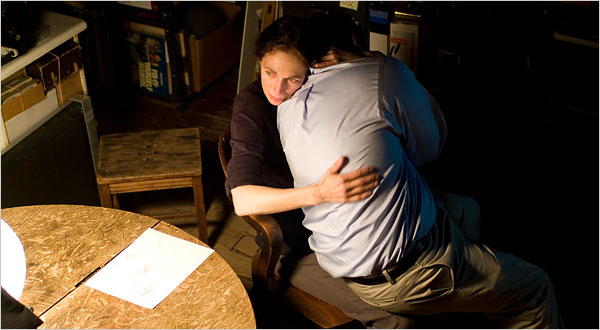|
Reviews of Recent Independent, Foreign, & Documentary Films in Theaters and DVD/Home Video
MOMMA’S
MAN Momma’s Man captures a longing for youth, comfort, and sanctuary with devastating precision. Director Azazel Jacobs blends his real-life parents and their eccentric Tribeca loft with the magnetic appeal of childhood to create this memorable quasi-documentary, steeped equally in psychology, humor, and downtown Manhattan. During a gray New York winter, Mikey (Matt Boren), a young, California-based husband and father, stays with his parents after a business trip brings him to the city. But when the visit comes to a close and the A train is about to take him to the airport, he recoils into his raggedy scarf and returns to his parents’ apartment. The first of many lies is that the plane was overbooked. But as the days pass and the excuses multiply, his intention to leave withers. Suddenly, we see a man instinctually regressing into the safety of his past. Aside from visiting an old friend (Piero Arcilesi, whose role—not to mention his charming rendition of “Closer to Fine” by the Indigo Girls—is funny and sincere), Mikey grows increasingly unable to leave the apartment and, eventually, barely able to move. Swaddled in sweats or lounging in tighty whities, he gives into an existential crisis by delving into high school memories and his mother’s dinners, finding refuge in his old home. And it isn’t just any home. The walk-up studio serving as Mikey’s cocoon is a Mad Hatter hodgepodge of art, gadgets, records, and furniture from every era but the present. Things drip impossibly from every nook and cranny, and a dusty skylight shyly illuminates the mess. The orchestrators of this madness are experimental filmmaker Ken Jacobs and his wife Flo, a painter. As members of an authentic American bohemia, they exude an otherworldly detachment from all aspects of life outside of beauty and intellectual thought. If she weren’t the director’s mother, I would take Flo as a figment of his imagination—she chants breakfast options with the same delicate cadence she uses to discuss avant-garde art and seems to fill the screen with hypnotic kindness. Because it’s never
explicitly stated what Mikey is hiding from, his self-imposed
hibernation can be seen as a catchall metaphor for our culture’s fear of
obligation and growing old. On the other hand, Jacobs may have become so
engrossed in documenting the progression of Mikey’s emotional implosion
that cause, explanation, and narrative simply got lost in the art.
Yana Litovsky
|


